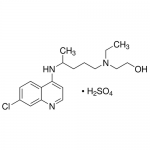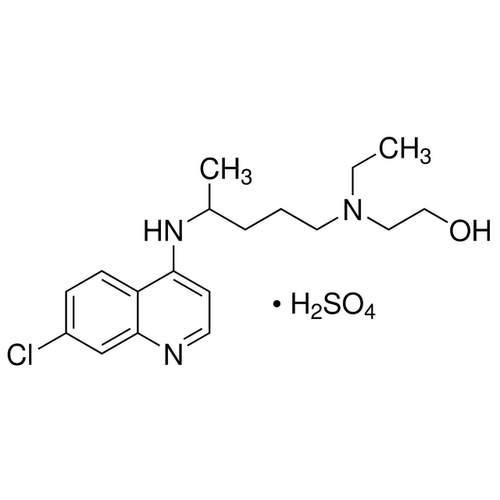| Product Name | Hydroxychloroquine |
| Description |
Autophagy inhibitor |
| Purity | >98% |
| CAS No. | 747-36-4 |
| Molecular Formula | C18H26ClN3O•H2SO4 |
| Molecular Weight | 433.95 |
| Field of Use | Not for use in humans. Not for use in diagnostics or therapeutics. For in vitro research use only. |
Properties
| Storage Temperature | -20ºC |
| Shipping Temperature | Shipped Ambient |
| Product Type | Inhibitor |
| Solubility | Soluble in greater than 20 mg/ml H2O. |
| Source | Synthetic |
| Appearance | White to off-white powder. |
| SMILES | C1=C2C(=CC(=C1)Cl)N=CC=C2NC(CCCN(CCO)CC)C.O=[S](O)(O)=O |
| InChI | InChI=1S/C18H26ClN3O.H2O4S/c1-3-22(11-12-23)10-4-5-14(2)21-17-8-9-20-18-13-15(19)6-7-16(17)18;1-5(2,3)4/h6-9,13-14,23H,3-5,10-12H2,1-2H3,(H,20,21);(H2,1,2,3,4) |
| InChIKey | JCBIVZZPXRZKTI-UHFFFAOYSA-N |
| Safety Phrases |
Classification: Acute toxicity, Oral (Category 4), Eye irritation (Category 2A) Safety Phrases: S22 - Do not breathe dust. S24/25 - Avoid contact with skin and eyes. S36/37/39 - Wear suitable protective clothing, gloves and eye/face protection. Hazard statements: H302- Harmful if swallowed. H319- Causes serious eye irritation. Precautionary statements: P264- Wash skin thoroughly after handling. P270- Do not eat, drink or smoke when using this product. P280- Wear protective gloves/ eye protection/ face protection. P301 + P312- IF SWALLOWED: Call a POISON CENTER or doctor/ physician if you feel unwell. P305 + P351 + P338- IF IN EYES: Rinse cautiously with water for several minutes. Remove contact lenses, if present and easy to do. Continue rinsing. P330- Rinse mouth. P337 + P313- If eye irritation persists: Get medical advice/ attention. P501- Dispose of contents/ container to an approved waste disposal plant. |
| Cite This Product | Hydroxychloroquine (StressMarq Biosciences Inc., Victoria BC CANADA, Catalog # SIH-400) |
Biological Description
| Alternative Names | Hydroxychloroquine sulphate, 7-Chloro-4-[4-(N-ethyl-N-b-hydroxyethylamino)-1-methylbutylamino]quinoline |
| Research Areas | Autophagy, Cancer |
| PubChem ID | 12947 |
| Scientific Background | Hydroxychloroquine was first established as an anti-malarial agent, but is now being used in a variety of applications, including the inhibition of autopagy. Hydroxychloroquine is a lysosomotropic agent and therefore inhibits autophagy by obstructing the final step of autophagy, the fusion of autophagosomes with lysosomes, thereby preventing the acidification of the lysosomal compartment. In the context of cancer, autophagy is thought to be adopted by tumor cells to survive in the nutrient-deficient and hypoxic tumor environment. Hydroxychloroquine has therefore been studied extensively within the context of certain cancers. |
| References |
1. van Loosdregt J., et al. (2013) J Allergy Clin Immunol. 131(5): 1443-6.e1. 2. Lotze M.T., et al. (2013) Cancer J. 19(4): 341-7. 3. Xie X., et al. (2013) PLoS One. 8(1): e55096. |



Reviews
There are no reviews yet.